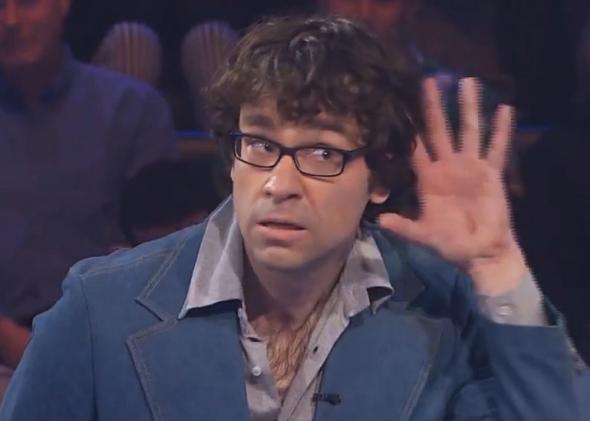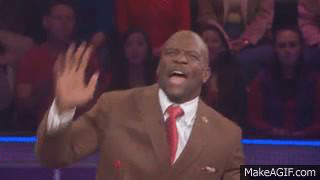My Secret Life as a Game Show Contestant
Everything the Slate office asked me, Justin Peters, about my Millionaire appearance.

© ABC Entertainment
Here was the scene on Tuesday afternoon in the Slate New York office. Not the usual scene, but the way it was this week:
The whole Slate NY office is going nuts watching our @justintrevett's manic run on Who Wants to Be a Millionaire. pic.twitter.com/RrZdjoxkT9
— Will Oremus (@WillOremus) February 3, 2015
True story. Beloved colleague and writer Justin Peters appeared as a contestant on the Feb. 2 and 3 broadcasts of Who Wants to Be a Millionaire—which yes, remains on the air.
And Justin did well. Not a million dollars well, but certainly well by the standards of an average Tuesday afternoon at Slate. Make sure you check out Justin’s candid reflection about his experience in an essay published Wednesday in Slate, and you can also read this piece Justin published on Monday before his final appearance aired.
Immediately after Tuesday’s episode aired, Justin answered questions from a group of Slate staffers over Slack, an instant messaging platform used across the Slate offices. What follows are some edited highlights from that discussion—everything Slate wanted to know about Justin’s secret life as a game show contestant. —Jeff Friedrich, Slate Plus
* * *
Justin Peters: Hi guys!
Jeremy Stahl, senior editor: It’s him!
Peters: Back from reliving the darkest moment of my life. Before I get started, I just want to note that the bar where I was watching the show was pretty much entirely deserted except for one random drunk who lost his shit when he realized that I was the guy on TV.
He was screaming so loud that I could barely hear the TV. Anyway.
Heidi Strom Moon, product manager: Where did you get that epic blazer?
Peters: I got the blazer at Rick Walker’s vintage store on Newbury Street in Boston. It was the best $50 I’ve ever spent. When I was standing on the stage waiting to make my entrance at the beginning of the game, Terry Crews looked at me, nodded approvingly, and said “I love that blazer, man!”

Also, the blazer has a big mustard stain on it, but apparently that didn’t show up on TV.
Dan Kois, culture editor: What kind of mustard, Justin?
Peters: Unclear. It was there when I bought the blazer. French’s, by the looks of it.
Amanda Hess, staff writer: I noticed it said you were from Lake Bluff, Illinois, instead of Brooklyn. How did they determine where you’re “from”?
Peters: I told them to say that I’m from Lake Bluff because I wanted to rep my hometown. I knew that people from home would be more excited about seeing my town’s name on TV than people from NYC would have been.
Hess: Slash, how do they determine what you “do” for a living?
Peters: They decide what you “do” based on what they think would make the most interesting conversation topic. Being sort of a semi-employed drifter, I have lots of weird income streams. Working for Slate is one of them. Selling beer at Wrigley Field in the summers is another.
I told them everything that I do, and they unilaterally decided to announce me as a part-time beer vendor. Which, honestly, is a more entertaining thing to be known as than “online journalist,” I guess.
Hey, check out occasional Wrigley beer vendor @justintrevett on Who Wants to be a Millionaire: http://t.co/i9Iadnhypi
— Wrigley beer man (@WrigleyBeerMan) February 2, 2015
Seth Maxon, home page editor: Seems like you went in with the intention to guess an answer no matter what, and to never to walk away with the money without guessing. I support this strategy, since you’re up $25K no matter what. But am I right that you went in thinking, “I’ll always guess for more money and not walk away,” or were you just actually pretty sure about that last question?
Peters: Pretty much, yeah. Mainly, I didn’t want to play tentative. I wasn’t ever going to walk away as long as I thought I had a 50/50 shot at getting the right answer.
I was sequestered in a “contestants room” for a day and a half waiting for my turn to play, and the only entertainment option was to watch old Millionaire episodes. In almost every episode I watched, it was clear that the contestants had predetermined that once they reached a specific dollar amount, they wouldn’t risk it on a question they weren’t absolutely certain about. This strategy made me really upset for some reason, and I vowed that I wouldn’t do that when I played.
As for the last question, I pretty quickly ruled out “Declaring war” and “Taking the oath of office.” I wish I had taken a bit more time to think it through, though, because if I had, I think I would have realized that the House of Commons clearly has nothing to do with crowning a royal. But I felt confident that I had a 50 percent shot at being right, and I went for it, and I don’t regret it. Not really.
(Not really = I’m mostly OK with my decision, but sometimes it still hurts.)
Maxon: FTR, I thought you were right—only drinking during the budget is dumb.
Doug Harris, director of technology: Did anybody else at Slate know the correct answer to that last question?
Jeffrey Bloomer, assistant video editor: I Googled it during. (So no.)
Stahl: Did you watch Slumdog Millionaire recently before going on? After getting two straight big-money questions you knew, you seemed to be describing things as fated (and it did sort of remind me of that film). (Editor’s note: Justin was able to draw from his own life experience to answer two questions, one of which was about the history of the Internet. The other is pictured below.)
Today, will Justin Peters face $1 million question next? Watch new #MillionaireTV @terrycrews: http://t.co/ap7IgChLcs pic.twitter.com/EAtJMcV5QB
— Millionaire TV (@MillionaireTV) February 3, 2015
Peters: I have never seen Slumdog Millionaire, but I’ve been told that there are some parallels to my own experience. It seemed really, really spooky that the big-money questions were so relevant to my own life experiences.
Incidentally, in 2004 I was on the verge of going to get a master’s degree from the London School of Economics, and if I had done so, I would surely have learned about the ceremonial “Budget Day” boozefest. Instead, I took a job with the Washington Monthly, where I earned $17,000 per year. The road not taken ...
Kois: Do you think your questions would have been different if you had been described as an “online journalist”? If you were not a beer vendor, would you maybe not have gotten the magazine or WWW Q’s? (I guess I am asking, does the contestant department talk to the question department?)
Peters: No, the questions would have been the same regardless of whether I described myself as a beer vendor, an online journalist, a Rhodes scholar (I am not a Rhodes scholar), or anything else.
There’s strict separation between the questions department and the production department. Neil the Lawyer made this very clear in his pre-show contestant briefing. The writers have their own little room that they never leave—more or less—and interaction between them and the producers is minimal. They don’t want to risk allegations of another Charles Van Doren scandal.
Kois: How hard was it to choose your lifeline person? Were other friends upset?
Peters: Yes! Other friends were upset! My friend Dan, who was the best man at my wedding, is, I think, legitimately offended that I didn’t ask him to be on the show.
My decision process was this: First, I needed someone whose expertise didn’t align with mine. I know a lot about history, and general trivia, and politics (not British politics, obviously). I wanted to choose a plus one who knew a lot about pop culture, in case I got a question about, like the Billboard Top 40. Dan is a really smart and learned guy, but his expertise and mine overlap. My friend Kelly knows a lot about pop culture. I thought she’d be more helpful. Second, I needed someone who could go on a moment’s notice. I only got like two days’ notice before appearing on the show. So I needed someone who could not only commit to being there with almost zero notice but could also commit to being there for two straight days. Kelly lives in New York and was ready to go at a moment’s notice. As it turns out, I think that Dan probably would have known that $500,000 question. But I also would have probably used him on the same question that I used Kelly on, so he wouldn’t have been around to help me out on the big money.
@terrycrews I took the shot! I wasn't afraid to take the shot. And that attitude will change my life more than the money would have.
— Justin Peters (@justintrevett) February 4, 2015
Ryan Vogt, copy editor: I minorly embarrassed myself on Jeopardy!, and still, frequently, dream that I’m back on the set, given another chance. Does your own dreamland look like the Millionaire set? Will you ever not be haunted?
Peters: I still lie awake at night sometimes thinking about it. The first week after I lost the money was really, really rough. It’s still rough at times. That’s a lot of money, and it was mine, and I could have walked away with it, and it would have changed my life. But I made my choice, and I have to live with it.
As I was leaving, I did sort of pathetically tell one of the producers that “If you ever do one of those episodes where you bring back old contestants for a second chance, I want in.”
Harris: Did you ever envision a few years’ worth of book leave if you had taken the money? (Editor’s note: Justin Peters is writing a book about Aaron Swartz and recently returned from a book leave.)
Peters: I envisioned a lot of things if I would’ve taken the money. Extending my book leave, yes. Pursuing some other crazy and implausible ambitions, also yes.
If, while I was on the show, I would have stopped and actually taken the time to think about all the ways that money could have changed my life, then I probably would have walked away. But I took the shot. And I missed.
And now my task is to try and find ways to make the fact that I took the shot—my decision to gamble when anyone else would’ve gone home—have as transformative an effect on my life as the money would have had.
@justintrevett took the shot! Not afraid to take the shot. And that attitude will change my life more than the money would have. DAMN RIGHT
— terrycrews (@terrycrews) February 4, 2015
